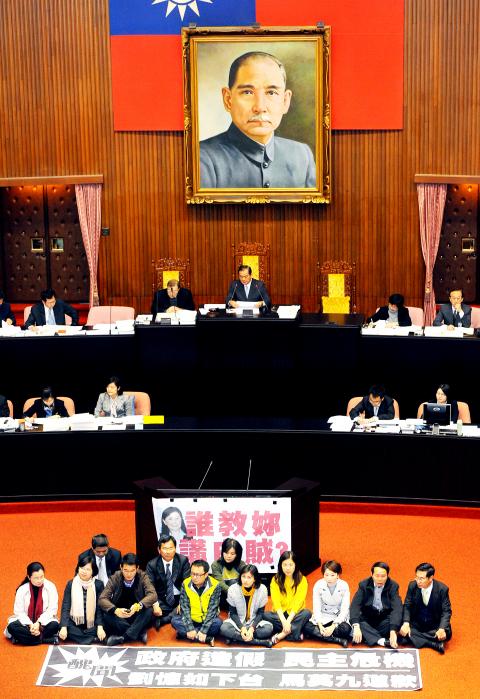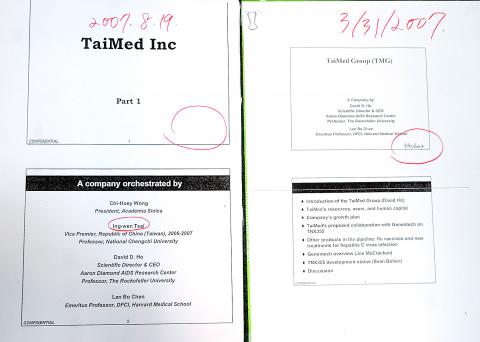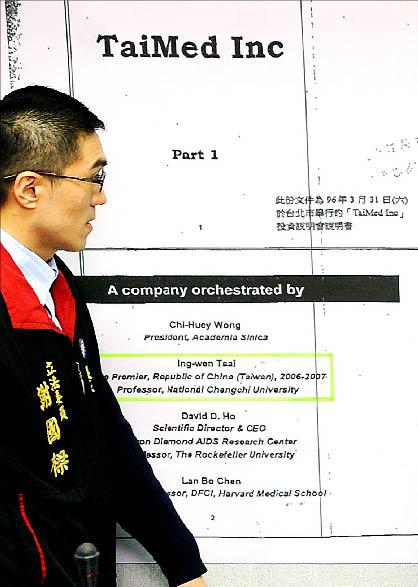Council for Economic Planning and Development (CEPD) Minister Christina Liu (劉憶如) yesterday apologized for confusing the date of a file on the formation of a biotech company allegedly involving Democratic Progressive Party (DPP) presidential candidate Tsai Ing-wen (蔡英文).
However, Liu said she would not apologize “for forgery” as the DPP demanded because the accusation was not true, even though the DPP has warned it would sue Liu if she did not issue an official apology by noon today.
“So sue [me],” Liu said. “A straight shooter would not be afraid of being sued by anyone.”

Photo: Wang Min-wei, Taipei Times
The DPP demanded a formal apology from Liu and the Chinese Nationalist Party (KMT) before noon today for accusing Tsai of wrongdoing in connection with Yu Chang Biologics Co (宇昌生技股份有限公司) while Tsai was the vice premier in 2007.
At a press conference yesterday morning, DPP officials showed two presentation documents which they said proved that Liu and the KMT had used inaccurate information to mislead the public on Monday. The DPP then demanded that Liu apologize before 3pm yesterday or else it would consider filing a lawsuit against her for document forgery and violating the Presidential and Vice Presidential Election and Recall Act (總統副總統選舉罷免法).
At the Monday press conference, Liu and the KMT displayed a document that they said was distributed by the TaiMed Group (TMG), the predecessor of Yu Chang, at an investor conference on March 31, 2007, and said the presentation document listed Tsai as one of the four principal leaders of the start-up.

Photo: Wang Min-wei, Taipei Times
Liu had not issued an official statement of apology when the DPP held a second press conference, during which DPP spokesperson Chen Chi-mai (陳其邁) demanded that Liu and KMT legislators Chiu Yi (邱毅), Hsieh Kuo-liang (謝國樑) and Lin Yi-shih (林益世) formally apologize to Tsai before noon today.
“Liu must also explain why she cited a fabricated document to make an accusation and tell us who was behind the scenes orchestrating this plot,” Chen said, reiterating that the party had not ruled out filing a lawsuit against Liu, KMT officials and KMT legislators over the “smear campaign.”
At the morning press conference, Chen said Liu and the KMT might have committed forgery and may have violated Article 90 of the election act, which stipulates that anyone who spreads a rumor or false statement for the purpose of getting a candidate elected or impeding a person’s election chances could be sentenced to a fixed term of imprisonment of up to five years.

Photo: Chu Pei-hsiung, Taipei Times
The document shown by Liu on Monday was actually a TaiMed Group presentation from Aug. 19, 2007, less than two weeks before the founding of Yu Chang on Sept. 5, Chen said, adding that Tsai’s name had been listed because she was a chairman-to-be after stepping down as vice premier in May.
That was why Tsai was listed as “Vice Premier of the ROC, 2006-2007” on the document, Chen said.
However, the KMT placed additional information on the document copies provided to the media that indicated it had come from the March investor conference, Chen said.
The presentation materials used in the March investor conference only listed the names of three scientists as TMG’s leaders, Chen said, adding that Tsai was not listed because she was still vice premier at the time.
DPP spokesperson Chuang Ruei-hsiung (莊瑞雄) slammed the KMT for launching a “smear campaign,” calling the effort “a trilogy of so-called whistle-blowing, intensive media scrutiny and judicial oppression.”
“By using false information in a press conference held at the Legislative Yuan, the KMT caused great harm to Tsai,” Chuang said.
At a separate setting, DPP Legislator Kuan Bi-ling (管碧玲) urged Liu, a well-known academic before entering the KMT government, to “tell the truth so that the case could not be exploited as a campaign ploy.”
People First Party legislative candidate Chen Cheng-sheng (陳振盛) also suggested yesterday that there was an invisible hand from the top of the KMT steering the allegations, urging that “until the real culprit is found,” Liu should not be made a scapegoat.
Yesterday afternoon, Liu apologized for having submitted an incorrectly dated document relating to Yu Chang Biologics Co, but said said she had never forged any documents.
“I am sorry for having presented a document with an incorrect date,” Liu told a press conference.
Liu blamed the error on a mechanical mistake that may have occurred when the former DPP administration was still in office.
Liu said the misattribution of the two dates was “not that serious,” adding that the DPP was blowing the issue out of proportion with its accusation of forgery and trying to change the focus of the issue.
Meanwhile, Liu, who is also the convener of National Development Fund, raised more questions about the investments made in Yu Chang by saying the case was strangely connected to two other companies that had applied to the fund — Taiwan Biopharmaceuticals Co (南華生技) and TaiMed Biotech Fund (台懋生技創業投資).
In related news, the KMT caucus proposed a motion later in the day to establish a cross-party legislative task force to thoroughly examine the allegations.
“Minister Liu has offered an apology for putting an incorrect date on the document, and we have told the executive branch that they should be more cautious in its provision of materials to lawmakers,” Lin said after Liu apologized.
The council’s error did not negate the need for Tsai to personally clear up the doubts raised by lawmakers, Lin said, referring to the eight questions put forward by the KMT caucus earlier yesterday.
One question was whether Tsai should explain if she had had a conflict of interest in connection with Yu Chang that would be covered by the Act on Recusal of Public Servants Due to Conflicts of Interest (公職人員利益衝突迴避法), Hsieh said.
“The Tsai family earned profits from their investment. Could she say that a conflict of interest didn’t occur?” Hsieh said.
DPP lawmakers launched a counteroffensive on the legislative floor last night, branding the Yu Chang case as “Taiwan’s version of the Watergate scandal.”
“The KMT administration falsified a document to slander Tsai Ing-wen and that is a shame on the country’s democracy,” DPP caucus whip Tsai Huang-liang (蔡煌瑯) said on the legislative floor during an interval between deliberations of bills.
Tsai Huang-liang led his collegues in chanting “Christina Liu, step down,” “Ma Ying-jeou, apologize,” while putting up a big-character poster reading: “Scandal. The Government Makes a False Accusation. Democracy is in Crisis.”
Another poster was hung on the podium that had a photograph of Liu and read: “Christina Liu. Who asked you tell the lie?”
In response to protesting by the DPP caucus, KMT Legislator Hung Hsiu-chu (洪秀柱) asked the DPP lawmakers not to get emotional.
“That the document was dated incorrectly was just a small blemish. Could it be that the DPP is trying to cover up any irregularities involving Tsai in this case?” Hung said.
Lin brushed off the need for the caucus to apologize because the earlier accusations it filed against Tsai Ing-wen were based on the document provided by the council.
Additional reporting by staff writer

CHAOS: Iranians took to the streets playing celebratory music after reports of Khamenei’s death on Saturday, while mourners also gathered in Tehran yesterday Iranian Supreme Leader Ayatollah Ali Khamenei was killed in a major attack on Iran launched by Israel and the US, throwing the future of the Islamic republic into doubt and raising the risk of regional instability. Iranian state television and the state-run IRNA news agency announced the 86-year-old’s death early yesterday. US President Donald Trump said it gave Iranians their “greatest chance” to “take back” their country. The announcements came after a joint US and Israeli aerial bombardment that targeted Iranian military and governmental sites. Trump said the “heavy and pinpoint bombing” would continue through the week or as long

TRUST: The KMT said it respected the US’ timing and considerations, and hoped it would continue to honor its commitments to helping Taiwan bolster its defenses and deterrence US President Donald Trump is delaying a multibillion-dollar arms sale to Taiwan to ensure his visit to Beijing is successful, a New York Times report said. The weapons sales package has stalled in the US Department of State, the report said, citing US officials it did not identify. The White House has told agencies not to push forward ahead of Trump’s meeting with Chinese President Xi Jinping (習近平), it said. The two last month held a phone call to discuss trade and geopolitical flashpoints ahead of the summit. Xi raised the Taiwan issue and urged the US to handle arms sales to

BIG SPENDERS: Foreign investors bought the most Taiwan equities since 2005, signaling confidence that an AI boom would continue to benefit chipmakers Taiwan Semiconductor Manufacturing Co’s (TSMC, 台積電) market capitalization swelled to US$2 trillion for the first time following a 4.25 percent rally in its American depositary receipts (ADR) overnight, putting the world’s biggest contract chipmaker sixth on the list of the world’s biggest companies by market capitalization, just behind Amazon.com Inc. The site CompaniesMarketcap.com ranked TSMC ahead of Saudi Aramco and Meta Platforms Inc. The Taiwanese company’s ADRs on Tuesday surged to US$385.75 on the New York Stock Exchange, as strong demand for artificial intelligence (AI) applications led to chip supply constraints and boost revenue growth to record-breaking levels. Each TSMC ADR represents

State-run CPC Corp, Taiwan (CPC, 台灣中油) yesterday said that it had confirmed on Saturday night with its liquefied natural gas (LNG) and crude oil suppliers that shipments are proceeding as scheduled and that domestic supplies remain unaffected. The CPC yesterday announced the gasoline and diesel prices will rise by NT$0.2 and NT$0.4 per liter, respectively, starting Monday, citing Middle East tensions and blizzards in the eastern United States. CPC also iterated it has been reducing the proportion of crude oil imports from the Middle East and diversifying its supply sources in the past few years in response to geopolitical risks, expanding